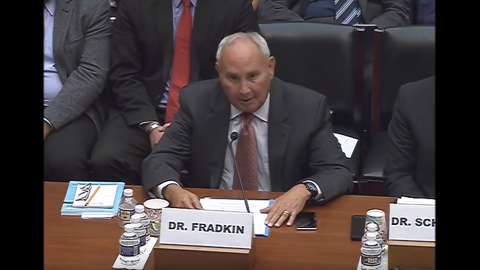On July 11, Hillel Fradkin testified before the U.S. House of Representatives Committee on Oversight and Government Reform. Following is the full text of his testimony:
I would like to thank Chairman DeSantis and Ranking Member Lynch, as well as their colleagues, for their invitation to address this hearing. It is a privilege to participate in this hearing and its discussion of a most important subject: The Muslim Brotherhood’s Global Threat.
This subject entails 3 general questions:
First: Is the Muslim Brotherhood a global threat?
Second: If it is a global threat, how successful has it been or might be?
Third: What can be done to address this threat?
In these remarks I will principally address the first two questions.
I expect we will address the third in the discussion.
Let me begin with the first and primary question: Is the Muslim Brotherhood a global threat?
Part of the answer is clear: The Brotherhood certainly means to be global and it means to be a threat. More specifically the Muslim Brotherhood is devoted to a political and religious project that in principle, in its essential character and goals, is hostile to other forms of politics, including our own. And it means for this project to be global in extent.
The global intent has been true of the Brotherhood from the time of its founding some 90 years ago by a school teacher named Hassan al Banna. Although an Egyptian, Banna looked to transcend his Egyptian base and establish his organization elsewhere in the world. This was not simple personal ambition. It followed from the character of the project.
What was that project?
In response to this question, Banna offered a simple five-fold formulation that has remained the motto of the Brotherhood:
“Allah is our objective. The Prophet is our leader. The Qur’an is our constitution. Jihad is our way. Dying in the way of Allah is our highest hope.”
Implicitly this rejected the contemporary political arrangements of his native Egypt that was in the process of becoming a modern nation state. But he also understood his project to apply to all Muslims and the forms of governance under which they lived. That is he rejected as such the nation state as a legitimate form of Muslim governance; he rejected it as a form of governance of alien origin and at variance with the traditional forms and ideals of Muslim governance that were imperial and ultimately global in character. But he also rejected the nation state because it was intimately connected with new modern ways of life that violated a proper Muslim way of life, a way of life, as he put it, constituted by the Qur’an.
Banna’s ultimate goal was a new Muslim state that would embrace all Muslims and would restore the authentic Muslim way of life as well as
restore Muslim political powered, military power, and Muslim prestige. To use a term that has recently become familiar it was to be an Islamic and not a national state, or rather The Islamic State.
In accord with this, Banna sought to establish branches of the Brotherhood in other countries and over time partially succeeded. Since Banna’s Brotherhood was based in an Arab country he had to expect some limits to its expansion to other non-Arab Muslims. But he found de facto partners in the form of analogous movements elsewhere – initially in South Asia; subsequently in Turkey.
Banna was murdered in 1948. But the essential tenets he prescribed for the Brotherhood have never been repudiated. They are reaffirmed in its instruction of new members. This is, I believe, not controversial or should not be.
What has been controversial is what the Brotherhood project practically means and where it falls within the universe of other radical Islamic organizations that have arisen since its founding, for example Al-Qaeda and the Islamic State of Iraq and the Levant. This controversy has a lot to do with two things: first, Banna’s original calculations about the best way to proceed with his project; second, the successes and failures of his project after his death and the calculations of the Brotherhood leaders who succeeded him.
First, as for Banna, despite the celebration of jihad and the immediate results it might provide, Banna thought that his project required a long period of implementation that required what came to be called the “gradualist” approach. This approach entailed the gradual transformation of society to Brotherhood principles before the seizure of political power, in Egypt and elsewhere. Indeed, he seems to have thought that through such a transformation the fruit of power would drop into the Brotherhood’s hands.
The main exception to the deferral of jihad during his lifetime was the mass participation of Brotherhood members in the general Arab attempt to destroy Israel in the 1948 War.
As for his successors, they had to deal with a series of successes and failures, especially failures. In the 1950’s and 1960’s Gamal Abdul Nasser, the president of Egypt, brutally suppressed the Brotherhood and executed its most charismatic figure, the ideologist Sayyid Qutb.
This led to three different results: first, some Brotherhood members were energetic in the reaffirmation of the gradualist approach; second, other Brotherhood members emigrated from Egypt, especially to Saudi Arabia but also to more foreign parts, for example Europe and the United States; but third, some Brothers repudiated the gradualist Brotherhood approach and went on to establish new radical organizations that put the stress on violent jihad, for example Al Qaeda.
This new situation has occasioned, especially since 9/11, a controversy about the Brotherhood and how to understand the threat it represents. The crux of this controversy was the suggestion that by comparison with Al Qaeda and other similar organizations, the Brotherhood was moderate and could be a force for moderation. It was argued that it no longer seriously embraced the radical vision Banna had enunciated and the establishment of an Islamic State. Rather it was ready to participate in ordinary politics and through that participation would further moderate. The alleged model of its new destination was something like the Christian Democratic parties of Europe.
We have now had one important test of these benign hopes and they have proven to be false. The form of this test was the Brotherhood’s sudden, if brief, rise to power in Egypt after the revolt of 2011. While in power it attempted to establish a new regime in Egypt that would more or less conform to its founding radical vision. This story has predictably some complicated twists and turns. But I want to stress that it was not an accident that it tried fully to implement its project as one can see from the views of Khairat al Shater expressed in the spring of 2011. Al Shater was the deputy guide of the Brotherhood and de facto the real director of its policy. In a speech to Brotherhood faithful he declared that the hour Banna had predicted, the hour that they had been waiting for and toiled for had arrived.
Well it turned out he was wrong. Where does that leave the Brotherhood today? Let me conclude with a few words on this subject.
Certainly within Egypt the Brotherhood is for the present a broken organization. But it has sustained defeats before, partially by finding bases elsewhere. In the 1960’s this meant Saudi Arabia; today it means Turkey and Qatar. What it will attempt to do from these bases remains to be seen. But I should note that recently Aymen al Zawahiri, the present head of Al Qaeda, reached out to the Brotherhood expressing nostalgic appreciation for the fact that Al Qaeda had been born out of the Brotherhood project and welcomed its members to join his own.
Thank you for your attention.

















